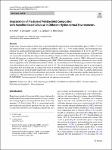Item Infomation
Full metadata record
| DC Field | Value | Language |
|---|---|---|
| dc.contributor.author | M. H., Wolf | - |
| dc.contributor.author | O., Gil-Castell | - |
| dc.contributor.author | J. Cea, Carrasco J. C. | - |
| dc.date.accessioned | 2023-04-20T06:34:51Z | - |
| dc.date.available | 2023-04-20T06:34:51Z | - |
| dc.date.issued | 2022 | - |
| dc.identifier.uri | https://link.springer.com/article/10.1007/s10924-022-02711-y | - |
| dc.identifier.uri | https://dlib.phenikaa-uni.edu.vn/handle/PNK/8137 | - |
| dc.description | CC BY | vi |
| dc.description.abstract | In this study, bionanocomposite films based on poly(lactide) (PLA) plasticised with poly(ethylene glycol) (PEG) (7.5 wt%) and reinforced with various contents of nanofibrillated cellulose (NFC) (1, 3, 5 wt%) were prepared. The hydrothermal degradation was investigated through immersion in several aqueous environments at temperatures of 8, 23, 58, and 70 °C as a function of time (7, 15, 30, 60, 90 days). The effect of water immersion on the physicochemical properties of the materials was assessed by monitoring the changes in the morphology, thermo-oxidative stability, thermal properties, and molar mass through field emission scanning electron microscopy (FE-SEM), thermogravimetric analysis (TGA), differential scanning calorimetry (DSC), and gel permeation chromatography (GPC). | vi |
| dc.language.iso | en | vi |
| dc.publisher | Springer | vi |
| dc.subject | PLA | vi |
| dc.subject | PEG | vi |
| dc.title | Degradation of Plasticised Poly(lactide) Composites with Nanofibrillated Cellulose in Different Hydrothermal Environments | vi |
| dc.type | Book | vi |
| Appears in Collections | ||
| OER - Khoa học Tự nhiên | ||
Files in This Item:

